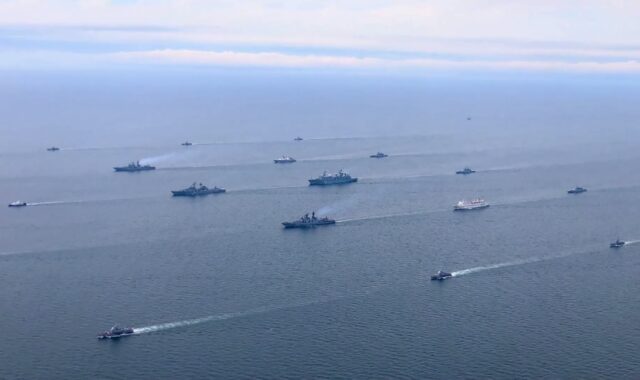Russian and Chinese warships began joint drills in the Sea of Japan on Tuesday, part of a major naval exercise that will see Moscow sail through waters spanning the Northern Hemisphere and Pacific.
Moscow and Beijing have deepened military and economic cooperation in recent years, as both countries seek to counterbalance what they see as a United States-led global order.
President Vladimir Putin will make an address formally opening the Russian-led “Ocean-2024” exercise and will oversee them “from a situation centre in the Kremlin,” his spokesman Dmitry Peskov said.
The drills will involve more than 400 warships, submarines and support vessels and last until 16 September, according to the Russian defence ministry.
China sent four warships and a supply vessel to the exercise, joining Russia’s naval fleet in the Sea of Japan, it said.
The wider drills will take place in the Pacific and Arctic Oceans, as well as the Mediterranean, Caspian and Baltic Seas, and are set to become “one of the Russian army’s main operational and combat training events of 2024,” it added.
Russia has a naval facility in the port city of Tartus on Syria’s Mediterranean coast, but it was not immediately clear whether this would be involved in the drills.
Also taking part are “more than 120 aircraft and helicopters … about 7,000 units of weapons, military and special equipment, and more than 90,000 personnel,” the ministry said.
Russia said the exercises were aimed at testing the “readiness” of the navy’s leadership, using weapons and expanding co-operation with “partner countries”.
The Japanese defence ministry said it had observed five Chinese naval ships entering the Sea of Japan heading in the direction of Russia over the weekend.
It “confirmed that these vessels sailed north-eastwards through the Tsushima Strait towards the Sea of Japan from Saturday to Sunday”.
Japan’s Self-Defence Forces “conducted vigilance monitoring and intelligence gathering” with a vessel and patrol plane, the ministry said, releasing photos of the ships.
The Tsushima Strait lies between South Korea and Japan and connects the South China Sea and the Sea of Japan — known as the East Sea to Koreans — and is not within Japanese territorial waters.
Rising tensions
China’s growing economic and military clout and its assertiveness in territorial disputes, most recently with the Philippines, has rattled the United States and its allies.
Russia and China have also ramped up military cooperation in recent years, with both railing against “Western hegemony”, particularly what they see as US domination of global affairs.
On August 26, Japan scrambled fighter jets after what it called the first confirmed incursion by a Chinese military aircraft into its airspace.
Last week, Japan protested after a Chinese naval ship entered its territorial waters.
Japan and Russia also have a territorial dispute over the Kuril Islands — known in Japan as the Northern Territories — and their relations have deteriorated sharply since the start of the Ukraine conflict.
Japanese and Chinese vessels have been involved in tense incidents in other areas, in particular, the remote Senkaku islands in the East China Sea claimed by Beijing, which calls them the Diaoyus.
Tokyo has reported the presence of Chinese coastguard vessels, a naval ship and even a nuclear-powered submarine in the area, and there have been a series of confrontations between Japanese coastguard vessels and Chinese fishing boats.
Last month Japan’s defence ministry sought 8.5 trillion yen ($59 billion) for the next fiscal year, its largest ever initial budget request, as part of the country’s five-year, 43-trillion-yen defence buildup plan through March 2028.

COMMENTS
Please let us know if you're having issues with commenting.